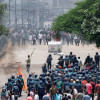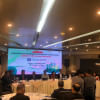A Reasonable Vice

A former family chauffeur was recently suspended from his beloved 'government job'. An ever-smiling and honest simpleton, he had left one of my relative's employ in a hurry to take up this lucrative vacancy, advertised via the (amazingly-efficient) chauffeurs' grapevine. But months later, he returned to his former employer, confused and meek. When asked what had happened, he explained that he had engaged in siphoning fuel and over-invoicing. He had raised ghost-vouchers and made up time-sheet attendance. To us it was unthinkable that this young idealist, who never misplaced a single taka, could be capable of such corruption.
But he quickly explained that it wasn't corruption or theft. It was an apparently known practice; the quintessential perk of a government job, in fact. Why else would he leave a family job and join an office where work-hours were considerably longer? Why else would he pay a commission to his 'agent' (another chauffeur) who arranged the hook-up? Given that multiple beneficiaries took cuts from his 'income' – there was simply no other way to perform his duties. If he didn't pay off the various functionaries of the pilferage-chain, he could be replaced with someone who would.
The above anecdote testifies how deep institutional corruption has permeated into Bangladeshi culture. The three systemic factors that seem to sustain such practices are applicable to a wide range of corrupt practices: (a) individual agenda of recovering initial investments made (bribe paid) while obtaining the job, (b) interdependent systems of organisational rent-sharing that retains only rent-seekers and expels those who refuse to pilfer state resources and (c) the lucrative rent-seeking business surrounding resource allocation, for which point (a) becomes necessary. Variations of these three economic incentives combine to create entrenched systems of institutionalised corruption.
Similar systems exist in public service delivery and procurement. Let's take the most profitable public service: revenue collection. Here we have a function involving direct payments from citizens to state coffers. Yet, the process is often riddled with challenges. Thousands of tax-dodgers evade or trick the system with the complicity of errant public officials: the deal is 'pay a large tax to the state or a small bribe to the collector'. Many small taxpayers tell stories of receiving requests to furnish returns and payment slips from the previous decade, or be forced to compensate in other ways. Paying municipal taxes without dishing out something extra for 'tea and biscuits' for collectors is allegedly impossible. It is the same with land tax, where corrupt officials and support staff create barriers to payment, in the hopes of extracting personal benefits. It's not difficult to imagine the extent of corruption plaguing sectors like infrastructure development, business regulation or environmental protection. In all of these cases, individuals forego collective interests in favour of their own.
That the Rana Plaza collapse was brought about by shoddy engineering and flagrant violation of warnings have been widely reported. It is reported that 41 people were charged in this connection. However, none of the institutional actors have been held to account. How, in the first place, did the builders get a permit to build a commercial building over a pond? How could it be that a commercial space was being used for heavy manufacturing? How were the unsanctioned floors constructed without municipal or building authorities noticing? The need to investigate (domestic) institutional failures was brushed off, in favour of somehow holding RMG buyers responsible. And it is great to see foreign apparel buyers committing to and funding building and fire safety. But where is the domestic action to ensure faulty buildings do not sprout up in other areas? How will factories be stopped from occupying buildings meant for other purposes?
The same point was made by political analyst Zia Hassan on the issue of the Bangladesh Bank 'hacking' incident. In a status, Hassan pointed out that within two months of the heist, the Philippines had already conducted public hearings in the senate, activated investigative units, frozen suspected accounts, rounded up a witness from an aircraft and recovered USD10 million from a casino. In contrast, our authorities spent the first month trying to cover up the heist, till international news media broke the story. Even then, few transparent and concrete steps have been taken apart from pointing fingers at the US Federal Reserve or SWIFT. Has a standard operating protocol been set in case of a central bank heist? Have jurisdictions been divided and investigative independence assured? What guarantees have been put in place to ensure that the central bank will not wait two months the next time something like this happens?
In an article about corruption, it would be grievously unfair to point a finger at the public sector only. With the proliferation of corporations, owners' direct oversight has been removed, leading to a surge in a variety of rent-seeking behaviours. These range from accepting 'gifts' from vendors to directly appropriating a percentage of agency fees in return for awarding the contract. For example, one film director asked me once – while working on a donor-funded video – what my 'cut' would be. He later explained that it was common practice for advertising managers to claim a percentage from directors' remuneration in exchange for contracting particular directors. Here also we see individuals putting their own interest before that of the employer.
The rapid growth of the Bangladeshi economy has also been marred by large-scale financial corruption. Take the case of multi-level marketing or MLMs (essentially Ponzi / Pyramid Schemes): in 2006, the NGO Jubok reported owing BDT 38 crores to its depositors. Five years later, the actual figure was determined to be BDT 2,164 crores, collected from some 267,330 depositors (mostly unemployed young men). Cases were filed and committees were formed – but little was done to criminalise MLMs and protect small investors. So, in 2013, we discovered Destiny Group's top executives embezzling and/or laundering BDT 3,285 crores. That was nearly 2 percent of the national budget. How can our regulators fail so appallingly and so often at the same thing? Was the perpetrators' political clout so great that no example could be made of them? Was the formulation of a comprehensive policy to combat financial crimes too much to expect? See the consequences for yourself: last year, there were reports of at least eight MLM companies still operating in Bangladesh, using a stay order on a government decision (Ittefaq, March-23-2015). We may have to wait some more years for the next 'scam' to unfold; but unfold it will.
Attempting to address corruption, a case-by-case approach is hopeless. Each time laundering or embezzlement of funds in a financial institution results in the scapegoating of mid-level employees – the nexus is left unscathed. Worse yet, the policy and legal void, in which such activities took place, still remains. Resignations hold no value if the next embezzlement is not prevented. And this is where Bangladesh has been failing again and again.
As a nation, we have developed little measure of and against corruption. Year after year, Transparency International (TI) keeps publishing its woeful data. To this, status quo beneficiaries and eager nationalists often respond by attacking TIB, its trustees and their motivations. We must realise that this is infantile for a nation well into its fifth decade of existence.
Corruption – rent-seeking, fraud, laundering, nepotism etc. – is an effective and efficient practice. It is anchored by its economic incentives and its transactional nature. Individuals and groups benefit at the cost of the greater collective (e.g. the country). So, this behaviour needs to be repeatedly discouraged: if that takes dismantling businesses, repossessing assets and a few public floggings, so be it. Fighting corruption means disappointing a lot of its beneficiaries. A strong and popular political leadership, such as the one in power now, has the power to take that strong, if unpopular, stance on corruption.
The writer is a strategy and communications consultant.

 For all latest news, follow The Daily Star's Google News channel.
For all latest news, follow The Daily Star's Google News channel. 








Comments